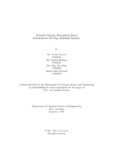Towards solving perception based autonomous driving assistant system
Abstract
This thesis scrutinizes the problem of perception in the self-driving car system. Selfdriving
car is the face of the future and the decade’s research focus. Tech giants
like Google, Uber, Tesla, Commai, Intel MobilEye etc. are now immensely investing
in this particular technology. In our work, we mainly address the perception problem
of autonomous vehicle and try to solve it with only cameras and comparatively
lower computational cost. Firstly, to detect the lane we propose QLD (Quick Lane
Detection) model on CULane dataset which gives significantly improved results in
the roads of countries like Bangladesh than other existing methods. Secondly, for
object detection we propose our own dataset BDCO or Bangladeshi Common Objects,
and merge it with MS COCO dataset to make it suitable for Bangladeshi
roads. We train BDCO dataset in a CNN based object detection model (CbOD)
which also gives very promising results in local roads. Finally, we cascade QLD and
CbOD with our decision-making system which outputs the warnings based on the
analysis of the inputs from cameras in the vehicle. Our hands-on evaluations show
that, our cascaded network Bangladeshi Driving Assistant (BD-DA) attains performance
competitive to the state-of-the-art systems on a indistinguishable benchmark.

